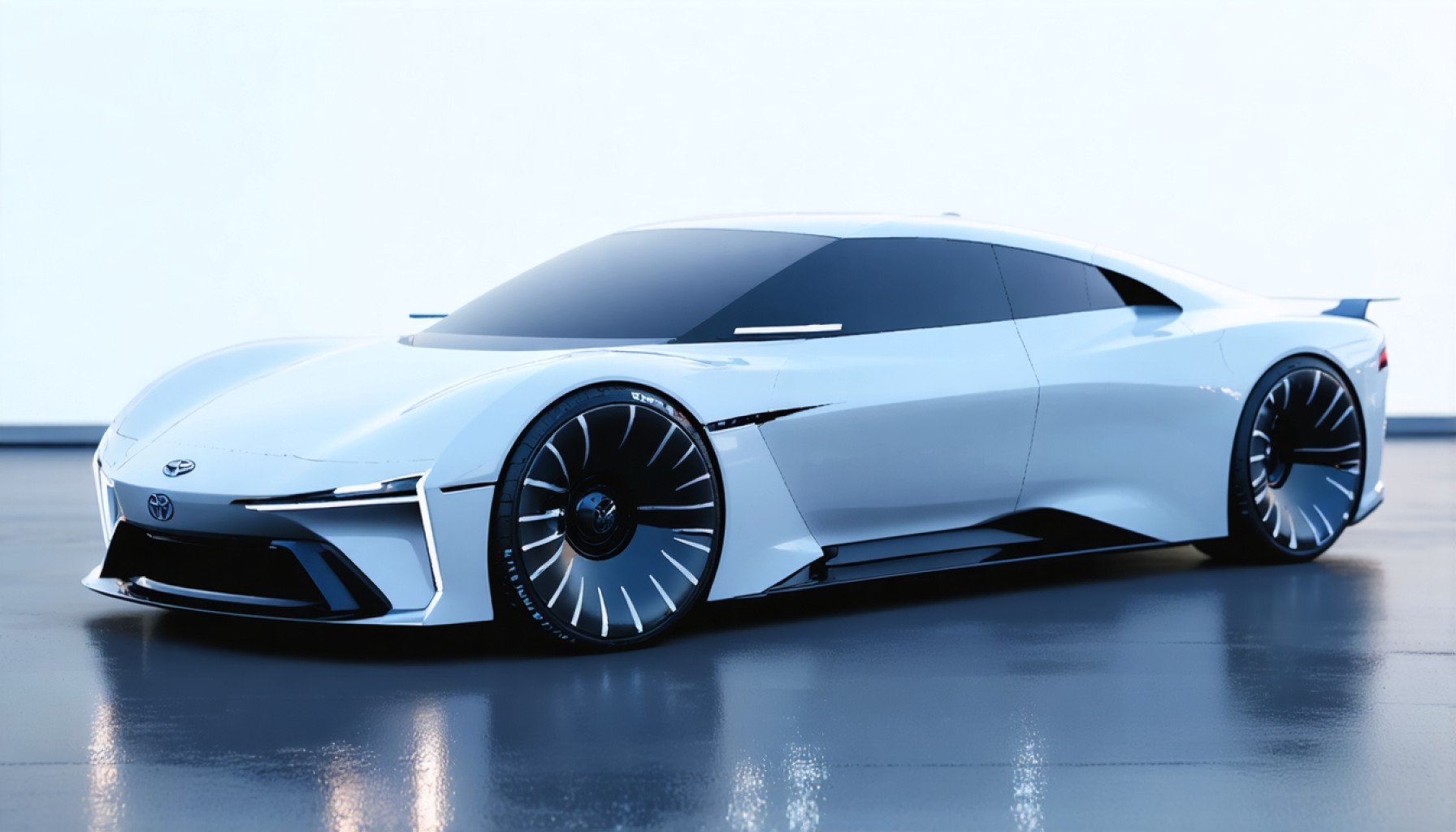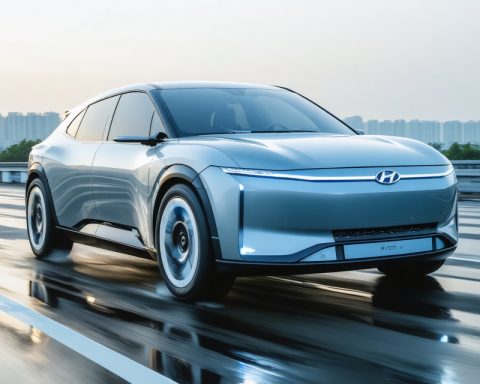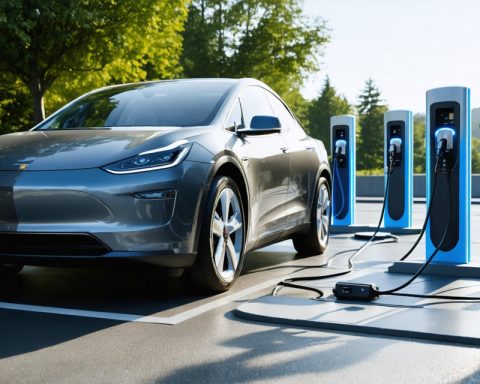- Toyota’s plans for an advanced electric vehicle (EV) battery factory in Fukuoka Prefecture have been unexpectedly delayed.
- The delay affects the production of batteries intended for the Lexus brand by 2028, crucial to Toyota’s electrification strategy.
- The decision to pause comes amidst uncertain global demand for electric vehicles, as highlighted by Toyota’s President, Koji Sato.
- Despite aiming to sell 1.5 million EVs by 2026, changing consumer behaviors and market dynamics prompt Toyota’s reevaluation.
- This delay underscores the challenges the global economy faces in embracing electrification at the previously anticipated pace.
- Toyota’s cautious approach exemplifies the balance needed between innovation and market realities in the evolving EV landscape.
- The strategic pause is a moment for reflection, emphasizing the complexity of the transition towards electrification.
Amid the bustling energy of Nagoya, the industrial giant Toyota stands at an unexpected crossroads. Towering cranes and the hum of construction were meant to dominate the skyline of Fukuoka Prefecture, where Toyota had ambitious plans to erect a cutting-edge electric vehicle (EV) battery factory. Yet, in a twist that reflects the unpredictable nature of global markets, these plans have hit a sudden pause.
The echo of hammers should have resounded across the town of Kanda by now, laying the foundation for what was to be a cornerstone in Toyota’s electrification strategy. This factory, with its promise to churn out advanced batteries for the luxurious Lexus brand by 2028, is now enveloped in uncertainty. As the world stands at the brink of an electrified future, the whispers of faltering demand have traveled from market analysts to the top corridors of Toyota Motor Corp.
In a pivotal dialogue with Fukuoka’s Governor, Seitaro Hattori, Toyota’s President Koji Sato painted a picture of caution. The decision to delay—unsettling but essential—comes as the automaker re-evaluates global trends that suggest a more subdued appetite for electric vehicles than anticipated. Despite its bold ambition to sell 1.5 million electric vehicles by 2026, Toyota faces the cold reality of evolving consumer behaviors and market dynamics.
This move could be more than a strategic pivot; it raises profound questions about the readiness of the global economy to embrace electrification at the speed many had forecasted. For an industry leader that has long championed hybrid technology, this recalibration signals a broader, perhaps more prudent, approach to the electric transformation.
The pause offers a moment for reflection. It underscores the delicate balance automakers must maintain: driving innovation while attuned to market realities. As the EV landscape shifts, Toyota’s decision serves as a reminder of the intricate dance between ambition and feasibility.
In the grand tapestry of automotive evolution, Toyota’s path is a riveting chapter in progress. The delay is not an end but a strategic pause—one that might just shape a more resilient future. As the world watches, one thing is clear: the road to electrification is winding, and the journey ahead is as critical as ever.
Why Toyota’s Battery Factory Pause Signals a Shift in the EV Market
Navigating Uncertainties: Toyota’s Strategic Pause on EV Battery Factory
Amid the bustling choreography of automotive giants, Toyota’s decision to delay its electric vehicle (EV) battery factory in Fukuoka unveils more than just a temporary hiccup. It offers a lens into the evolving dynamics of the EV market. Let’s explore deeper into the factors and implications of this strategic pause.
Market Dynamics and Demand Fluctuations
1. Global EV Adoption Rates: Despite the aggressive push towards electrification, global adoption rates of EVs are uneven. Markets like China and Europe show robust growth, yet others, including parts of North America and emerging markets, display slower uptake. This variability can influence a manufacturer’s decision to invest heavily in EV infrastructure.
2. Consumer Behavior: A Deloitte study highlights that price sensitivity remains a critical barrier for EV adoption. Consumers are still worried about higher purchase costs compared to traditional vehicles, uncertain resale values, and charging infrastructure challenges.
3. Regulatory Environment: Changes in government policies and incentives can drastically affect EV demand. For instance, potential reductions in subsidies or tax breaks can lead to hesitancy among consumers and manufacturers alike.
Strategic Implications for Toyota
– Hybrid Leadership Remains Strong: While Toyota was initially slow to embrace full battery electric vehicles, it has maintained its lead in the hybrid sector. This delay might reflect Toyota’s intention to leverage its hybrid technology as a bridge solution while global EV adoption solidifies.
– Reassessment of Production Goals: The pause allows Toyota to re-evaluate production goals, ensuring they align with the current demand landscape. It also provides room to integrate more advanced technologies when the factory resumes construction.
Real-World Use Cases
– Consumer Considerations: For potential EV buyers, Toyota’s pause could signal caution. Consumers should consider not only the vehicle’s technology but also long-term support and infrastructure provided by the manufacturer.
– Industry Trends: Other automakers may take cues from Toyota’s approach, opting for a more gradual ramp-up of EV capabilities and infrastructure investments.
Pros & Cons Overview
– Pros:
– Resource Allocation: Toyota can redirect resources towards improving existing technologies and hybrid models.
– Market Responsiveness: By pausing, Toyota remains agile, ready to adjust to future market demands and technological advancements.
– Cons:
– Perception Risks: There is a potential risk of creating uncertainty in consumer confidence and investor sentiments regarding Toyota’s commitment to full electrification.
– Competitive Disadvantage: Manufacturers more aggressive in EV production could capture market share if demand surges rapidly.
Future Insights and Predictions
– Investment in R&D: Toyota is likely to channel efforts into research and development to enhance its battery technology, possibly reducing costs and improving performance metrics over the long term.
– Hybrid Demand: As hybrid technologies become a compelling alternative, Toyota’s robust lineup could see increased sales in regions hesitant to fully embrace EVs.
Actionable Recommendations
– For Consumers: Stay informed about local government incentives, which can significantly impact the total cost of ownership of an EV or hybrid vehicle.
– For Toyota: Maintain transparency with stakeholders regarding plans and progress. Clear communication can help alleviate concerns over strategy shifts.
For more insights into the automotive industry and Toyota’s path forward, check out Toyota’s official website.
In conclusion, while Toyota’s delay in its EV battery factory might initially signal a setback, it provides a necessary pause to align with global market realities. As electrification continues its journey, such strategic decisions will likely shape the automotive landscape, balancing innovation with pragmatic growth.














